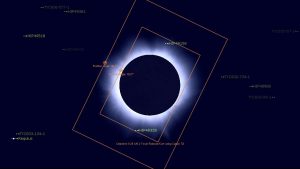
I heard recently there’s this eclipse thing coming on August 21 and while I’m going to be doing much the same as Randall Munroe’s character on the street (staring mouth agape at awesomeness) I’ll be pretending a bit at some actual science, too. We’ll be live streaming the view from our vantage point on YouTube, here.
This image is a decent simulation of what I’m looking forward to seeing with the fine folks at Linear Photonics in just a few short days. The yellow squares are some image frame references; what portion of the sky we think a camera might see at various magnifications. Because it’s not enough to travel 900 miles, spend a week in a cramped camper, and stare at the sky for about 2 1/2 minutes in awe we’ve decided to unnecessarily replicate an experiment. This experiment “proved” Einstein’s theory of general relativity. This adds months of tedious preparation, expenses for shipping, and arcane arguments about Dawes’ limits (also, irrelevant). What’s a little fun among friends if you can’t over complicate the entire affair? I don’t think we’ve added enough to juggle, so we’ll somehow squeeze in temperature logging, a trip to see some Americana, and more than a few debates over the nature of something we’ll forget the next morning.
You can read all about the original experiment elsewhere. The basic premise is that light from stars which appear near the sun in the sky will bend due to the sun’s gravity, putting those stars out of position slightly. Our goal is to measure that change in position, which is only the tiniest fraction of the width of a human hair held at arm’s length. An eclipse offers us a unique opportunity to repeat the original experiment, since the sun will be blotted out and the dim light from those stars near the sun might be captured by our telescopes and cameras.
Is this necessary? No. General relativity is pretty solid and needs no help from us. Heck, we’re just amateurs who happen to have an interest in the physics, the math, and looking up. Any real astronomer or physicist wouldn’t be interested in replicating such an overdone experiment, anyway. That’s, counter intuitively, one of the reasons I like this effort: replicating experiments isn’t sexy but we’re in it to learn something, to test our abilities, and hopefully come up with the same result as expected by theory. Repeating an experiment is apparently the last thing scientists want to do. Since I’m not a scientist, I get to make it the FIRST thing on my list.
Light is the business of Linear Photonics, and this is a cool way for them to support a little citizen science in the name of their core mission. Also, some of the folks traveling with us have never looked through the eyepiece of a proper telescope before. Everybody wins, even if the experiment is a bust (it won’t be).
We’re not photogenic, so don’t expect to see our faces on the live stream. That camera is going to be pointed straight at the sun, for you, Internet bandwidth permitting. Don’t forget your safety squints!
